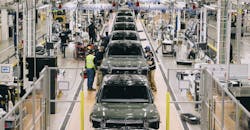Rivian Pauses EV Plant Project in Georgia
EV manufacturer Rivian has put on hold its $5-billion plan to manufacture midsized e-SUVs at a new plant east of Atlanta, Ga. The new R2 vehicle will be manufactured instead at Rivian’s current plant in Normal, Ill., with the business explaining the move will conserve cash and accelerate production for the new model’s launch in 2026.
The announcement came as an addendum to the automaker unveiling the R2 and two additional models, the R3 and R3X.
“Beyond significantly reducing the amount of capital needed to bring R2 to market, the company believes this approach considerably reduces risk to the launch and associated ramp; efficiently leverages its existing manufacturing and operations teams; and expands the total capacity for the site to 215,000 units per year,” according to the automaker’s statement.
“Rivian’s Georgia plant remains an extremely important part of its strategy to scale production of R2 and R3. The timing for resuming construction is expected to be later to focus its teams on the capital-efficient launch of R2 in Normal, Illinois,” it continued.
There was no commitment to a new schedule for the Georgia project. Rivian also did not indicate a date for starting production of the R3 and R3X variants.
The plant to be built near Social Circle, Ga., announced in 2021 and originally set to employ up to 7,500, would produce up to 200,000 vehicles by late this year in its first phase. It also would have battery-pack assembly operations. A second phase of construction would add another 200,000 EVs to its output.
The Rivian plant in Normal, Ill., now produces the R1T pickup truck and R1S SUV. It also produces a line of electric light-commercial vehicles, meaning delivery trucks.
The R2 will be Rivian’s midsize electric SUV, while R3 will be a midsize crossover vehicle. R3X is a “performance variant of R3” that will offer off-road functions. Both R2 and R3/R3X will be based on a new midsize vehicle platform that consolidates and eliminates parts (including high-pressure diecastings, a structural battery unit, and closure systems that reduce complexity. Both models also adopt Rivian’s drive unit platform and internally developed network architecture, computer topology, and software stack.
